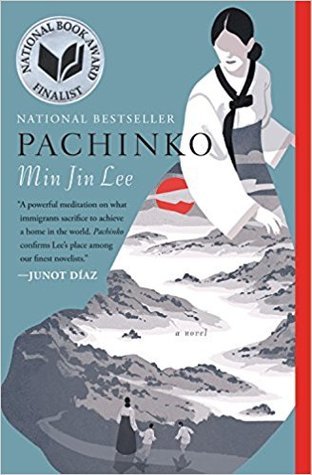Pachinko – Min Jin Lee

Hey Everyone!
Well, we had another terrific discussion on a wonderful book – Pachinko, by Min Jin Lee. It was such a good story, I’m tempted to say it’s the best book I’ve read all year. I have noticed though that I’ve said that about the last three books we’ve read, so obviously I think our group chose some amazing books to read this year! It was an awesome book though, right?
For this novel, the author follows four generations of a Korean family that lives in Japan. It spans from Yeong-do, Korea around 1910 after Japan has annexed Korea all the way to Osaka, Japan. The story starts in Yeong-do, with a fisherman and his wife, who run a boarding house. They have a daughter named Sunja, who becomes involved with an older middle-aged man named Hansu. Sunja doesn’t know at the time that he is married, is actually Korean but passes as Japanese, and is a gangster in Japan. Later in the book, he ends up owning Pachinko parlors, which is still today a very lucrative form of gambling in Japan, with most of the parlors operated by Koreans. Sunja ends up pregnant with a boy and marries a Korean pastor in Osaka, Japan with whom she has a second son. The story continues as the sons grow older and become very different men – one passing as Japanese and the other embracing his Korean ancestry. Throughout, the story is about survival , about hope, and how a family copes. It’s about culture and how it can impact the choices people make.
The cultural aspects of the book are fascinating. Women were expected to do a man’s bidding, no matter what. Being born out of wedlock was a shame you could never escape. For those Koreans born in Japan, they were not considered Japanese citizens and had to register as a foreign national when they turned 18. Koreans had both Korean and Japanese names. The consequences of war impacted just about everyone. Pachinko gambling was looked down on as a profession, even though it made its owners wealthy and had both Korean and Japanese patrons. There seemed to be a lot of secrets throughout the book that haunted those who harbored them. The correlations between living a life and gambling are endless; the title of the book is aptly named!
If you haven’t read the book yet, don’t let its size scare you off. You’ll be so engrossed, I promise you’ll keep reading – and that happens on the first page!
As a side note, our reading group commented that we have been reading a number of books this year that touch on the experiences of immigration and the implications for families, whether it be in America, Africa, Japan, Korea, Mexico, Canada or other countries. Some of the immigration was forced, some of it was voluntary. For me, reading about immigration from so many different perspectives has been enlightening.
Thanks again for all that you contribute to the group. Hope to see you on November 20 to discuss Educated, by Tara Westover. It also should be a great discussion. We should also have our book choices for 2020 finalized by then. See you in November!
Cheers, Donna Geer


